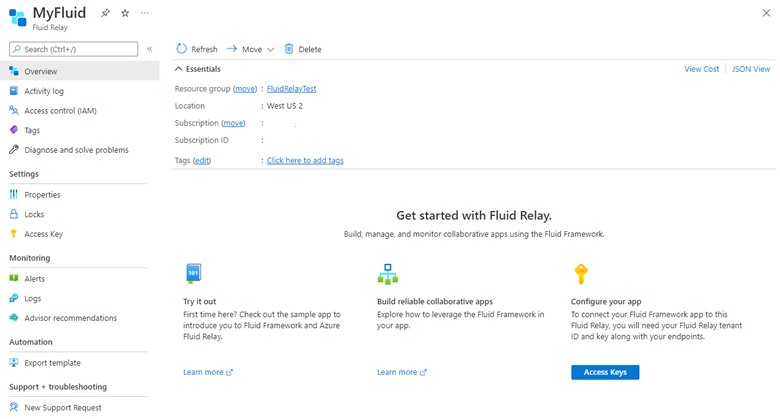
MMS • Steef-Jan Wiggers
Article originally posted on InfoQ. Visit InfoQ
Recently, Microsoft announced its Azure Fluid Relay service’s general availability (GA). This managed cloud offering enables web developers to use the Fluid Framework for building enterprise-grade collaborative applications.
Azure Fuild Relay service is built upon WebSockets, a full-duplex communication channel supported by modern web browsers. The innovation in Fluid Framework announced in 2019 at Microsoft’s Build developer conference is that it supports distributed and synchronized shared state – so that creating a collaborative application is simplified. The only supported language currently for the Fluid Framework is TypeScript or JavaScript.
Developers can set up and run their applications with Azure Fluid Relay by provisioning the Azure Fluid Relay service in their Azure account and configuring the azure-client SDK package to connect their applications to the Azure Fluid Relay instance.
The azure-client package has an AzureClient class that allows developers to interact with Fluid. The class contains the logic of connecting the Fluid container to the service. In addition, developers need to update their app’s configuration to connect to the Azure service with the correct configuration values.
import { AzureClient, AzureConnectionConfig } from "@fluidframework/azure-client";
const clientProps = {
connection: {
type: "remote",
tenantId: "YOUR-TENANT-ID-HERE",
tokenProvider: new AzureFunctionTokenProvider(
"AZURE-FUNCTION-URL"+"/api/GetAzureToken",
{ userId: "test-user",userName: "Test User" }
),
endpoint: "ENTER-SERVICE-DISCOVERY-URL-HERE",
},
};
const azureClient = new AzureClient(clientProps);
Note that Microsoft also offers WebSocket-based services with Azure Web PubSub, a fully-managed service that supports native and serverless WebSockets and Azure SignalR, which allows developers to add real-time web functionality to applications. The latter is not designed to abstract distributed state in the same way as with Azure Fluid Relay. Furthermore, with Azure Web PubSub, similar to SignalR, without client or protocol requirements developers can bring their own WebSocket library.
In a Microsoft Developer blog post, Mathangi Chakrapani and Pranshu Kumar, both senior product marketing managers at Microsoft, wrote:
The service enables developers to build and deploy enterprise-ready collaborative applications that perform at industry-leading speed and scale. Azure Fluid Relay takes care of all details of Fluid collaboration while you as developers focus your attention on your app and end-user experience.
Currently, the Azure Fluid Relay service is available in around 10 Azure regions – half of which are in the US – on a pay-as-you-go basis. More details on pricing are available on the pricing page. In addition, developers can find more information and guidance through the documentation landing page.
